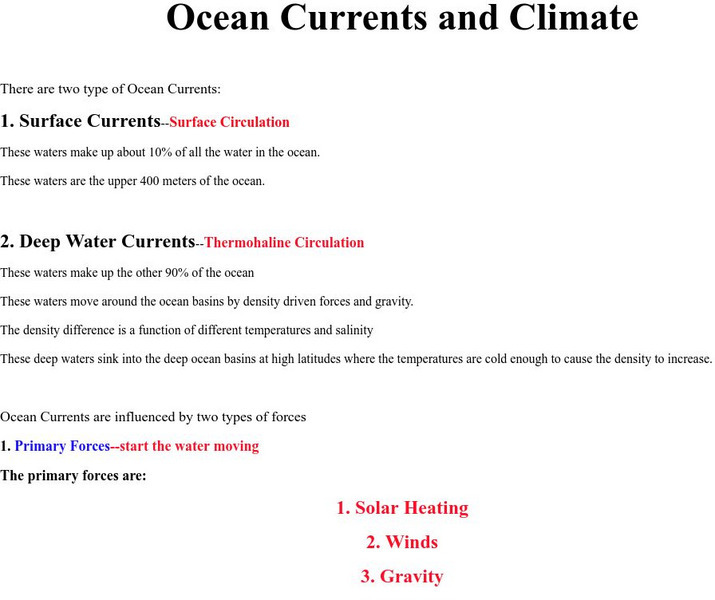Curated OER
Oceans: Water, Water Everywhere. . . but Only on the Earth!
It's not long, but it's thorough! This PowerPoint takes 4th - 8th grade earth scientists deeper into the oceans. They learn about tide and current activity and the forces that drive them. They also discover how wind and the rotation of...
Curated OER
Ocean Circulation
In this physical oceanography PowerPoint, viewers learn about ocean circulation, sea surface temperatures, and salinity. Relationships among these aspects are explained, as well as their impact on the atmosphere and climate. Each slide...
NOAA
Noaa: National Ocean Service: Education: Currents
Illustrated tutorial explains the numerous factors which shape ocean currents. Animations help students visualize how these aspects constantly affect the water movement in the ocean and how scientists use this information to study ocean...
Massachusetts Institute of Technology
Mit: Blossoms: Will an Ice Cube Melt Faster in Freshwater or Saltwater?
Engage students in the study of the ocean and saltwater with these activities. Students will see that saltwater has different physical properties than freshwater - mainly density. This lesson can serve as a springboard into other...
Climate Literacy
Clean: Climate Change and the Oceans
Students discover the role that the oceans play in climate change, and how climate change affects the oceans. It is lesson eight in a nine-lesson module "Visualizing and Understanding the Science of Climate Change."
National Geographic
National Geographic: Mapping Ocean Currents
An unfortunate spill of 92,000 rubber ducks into the ocean in 1992 elicited invaluable information about global ocean currents as scientists tracked their journeys around the world. In this lesson, students first learn about the Ocean...
Climate Literacy
Clean: Global Ocean Conveyor Belt
This hands-on activity explores the driving forces behind global thermohaline circulation.
University of Southern California
University of Southern California: Ocean Currents and Climate
The climate of our planet is greatly affected by Earth's oceans. Learn here about the different oceanic currents and the role those currents play on climate.
NOAA
Noaa: Ocean Explorer: Hot, Cold, Fresh and Salty
Students simulate ocean water characteristics in order to recognize that the effects of salinity and temperature are the drivers of thermohaline circulation.
CK-12 Foundation
Ck 12: Earth Science: Deep Ocean Currents
[Free Registration/Login may be required to access all resource tools.] How different densities of water drive ocean currents.
CK-12 Foundation
Ck 12: Earth Science: Deep Ocean Currents
[Free Registration/Login may be required to access all resource tools.] Learn how water with different densities drives deep ocean circulation.
CK-12 Foundation
Ck 12: Earth Science: Deep Ocean Currents Study Guide
This comprehensive study guide covers the main terms and concepts needed for an earth science unit on deep ocean currents. Review questions are included at the bottom of the study guide.
Other
Bigelow Laboratory for Ocean Sciences: Salinity and Deep Ocean Currents
For this activity, students will investigate how temperature and currents affect the salinity of ocean water, making predictions after studying ocean maps. It is recommended that teachers do the experiment themselves before presenting it...
The History Cat
The History Cat: Geography Phenomenon: Hurricanes
Describes how ocean currents affect climates around the world and the impact of the Gulf Stream, which can cause hurricanes to form. The role of wind patterns in the Caribbean is also discussed.














